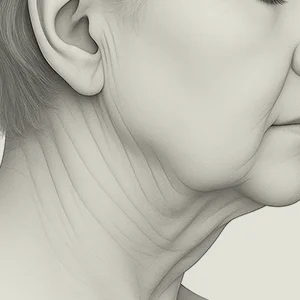No items found.

Loose or excess skin that develops on the neck.
Neck laxity occurs when collagen and elastin fibers weaken, leading to sagging skin and reduced firmness. Sun exposure, repetitive neck movements, genetics, and significant weight changes can accelerate the process.
First-line care may include collagen-stimulating injectables such as Sculptra or Ariessence Pure PDGF+ to restore firmness and elasticity, RF microneedling to tighten and remodel skin, and/or IPL or Sciton Moxi to improve texture and tone.
Adults with mild to moderate neck laxity seeking a nonsurgical approach to firmer, smoother skin.



Click on an area to learn more about treatments that can enhance and rejuvenate it.
.webp)
Lorem ipsum dolor sit amet, consectetur adipiscing elit. Suspendisse varius enim in eros elementum tristique. Duis cursus, mi quis viverra ornare, eros dolor interdum nulla, ut commodo diam libero vitae erat. Aenean faucibus nibh et justo cursus id rutrum lorem imperdiet. Nunc ut sem vitae risus tristique posuere.
See treatments
Lorem ipsum dolor sit amet, consectetur adipiscing elit. Suspendisse varius enim in eros elementum tristique. Duis cursus, mi quis viverra ornare, eros dolor interdum nulla, ut commodo diam libero vitae erat. Aenean faucibus nibh et justo cursus id rutrum lorem imperdiet. Nunc ut sem vitae risus tristique posuere.
See treatments